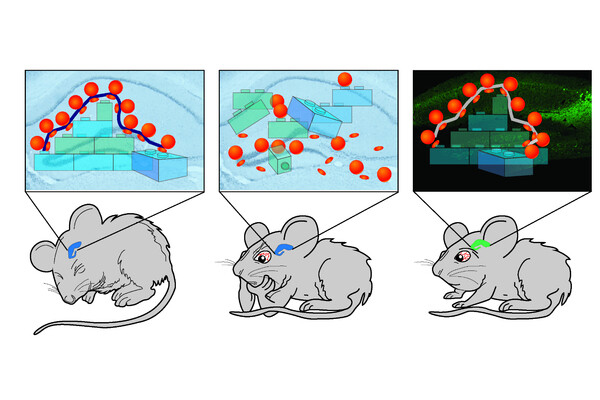5/18
Health Sciences
Penn Study: A Long-noncoding RNA Regulates Repair of DNA Breaks in Triple-Negative Breast Cancer Cells
The discovery of long non-coding RNA (lncRNA) has dramatically changed the understanding of the biology of diseases such as cancer. The human genome contains about 20,000 protein-coding genes – less than 2 percent of the total – but 70 percent of the genome is made into non-gene-encoding RNA.
Penn Medicine Study Uncovers New Pathways that Control Skin Tanning and Lightening
When skin cells responsible for pigmentation are exposed to estrogen or progesterone, the cells respond by adjusting their melanin production, resulting in either skin darkening or lightening. Although pregnant women often experience alterations in skin pigmentation, the reason for the changes has long puzzled physicians.
Cholesterol Levels, Not Statins, Influence Colorectal Cancer Risk, Penn Study Suggests
Long-term use of the cholesterol-lowering drugs known as statins does not appear to decrease a patient’s risk of colorectal cancer, suggests a new, large case-control study from Penn Medicine researchers published this week in&
Penn Team Restores Memory Formation Following Sleep Deprivation in Mice
Pulling an all-nighter may seem like a good way to cram before a test, yet science tells us memory suffers when sleep is sacrificed. A new study suggests that it doesn’t have to.
Penn Study on Fragile X Syndrome Uses Fruitfly's Point of View to Identify New Treatment Paths
Fragile X syndrome (FXS) is the most common genetically inherited cause of intellectual disability in humans.
Penn Study Suggests Changes in Skin "Microbiome" During Canine Atopic Dermatitis Could Lead to Antibiotic-Free Therapies for Human and Canine Disease
Atopic dermatitis (AD), a chronic inflammatory skin condition and the most common form of eczema, is estimated to afflict as much as 10 percent of the U.S. population, and is much more common now than it was 50 years ago. Veterinary clinical estimates also show that approximately 10 percent of dogs have atopic dermatitis.
Two Penn Medicine Physicians Elected to Association of American Physicians
Two Penn Medicine physicians – Ebbing Lautenbach, MD, MPH, MSCE, chief of the division of Infectious Diseases and the Robert Austrian Professor in the department of Medicine, and Ben Z.
Penn Study: Medicare Patients Have Low Adherence to Biologic Drug Therapy for Psoriasis
About half of Medicare patients who start taking biologic therapies for moderate to severe plaque psoriasis stop within a year, according to a study led by researchers from the Perelman School of Medicine at the University of Pennsylvania. Previous studie
Penn Study: Medicare Patients Have Low Adherence to Biologic Drug Therapy for Psoriasis
About half of Medicare patients who start taking biologic therapies for moderate to severe plaque psoriasis stop within a year, according to a study led by researchers from the Perelman School of Medicine at the University of Pennsylvania. Previous studie
Penn Medicine's Josep Dalmau Named Recipient of 2016 Cotzias Lecture and Award From AAN
Josep Dalmau, MD, PhD, an adjunct professor of neurology and founder and director of the Penn Center of Autoimmune Neurology in the Perelman School of Medicine at the University of Pennsylvania, was honored as a recipient of the American Academy of Neurology’s 2016 Cotzias Lecture and Award, at the organization’s 68th annual meeting that took place April 15-21 in Vancouver.
In the News
What’s going on with tranq?
Jeanmarie Perron of the Perelman School of Medicine says that the appearance and progression of skin ulcers and tissue loss on xylazine users is different than with other intravenous drugs.
FULL STORY →
It’s time to end the Medicare-Medicaid merry-go-round
In an opinion essay, Rachel M. Werner of the Leonard Davis Institute, Wharton School, and Perelman School of Medicine says that Medicare and Medicaid fail to integrate coverage and coordinate care across their two plans.
FULL STORY →
The quest for treatments to keep weight off after Ozempic
Researchers at Penn are conducting a co-authored study of the brains, fat and muscle cells, and eating patterns of people trying to maintain new body sizes.
FULL STORY →
Inside Penn’s transfer center
Penn Medicine’s transfer command center gets patients from affiliated hospitals and hospitals outside Philadelphia to specialized care that can save lives, with comments from CEO Kevin Mahoney.
FULL STORY →
Operating rooms are major sources of greenhouse gasses. Penn is eliminating a form of anesthesia that hangs in the air for more than a decade after use
Penn Medicine is phasing out the anesthesia desflurane at four of its six hospitals to eliminate harmful greenhouse gases, with remarks from Greg Evans.
FULL STORY →







